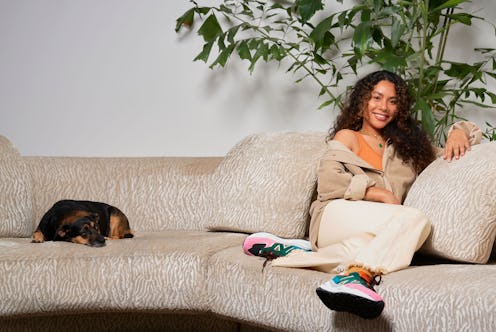Style
Why This Latinx Founder Says Representation Is Great, But Not Enough
CEO Brittany Chavez wants brands to take action.

Brittany Chavez is busy. During our Zoom interview, she stops mid-answer to apologize for the flurry of pings and notifications popping up on her computer.
Such is life when you’re the CEO and founder of Shop Latinx, a first of its kind marketplace for Latinx-owned brands that Chavez dreamed up more than five years ago.
Since launching in 2016, the brand has gone from a cult-favorite Instagram account among savvy, trend-forward Latinx consumers, to a venture-backed startup poised to completely transform the e-commerce landscape.
“The vision is really honed in on who this Latina Gen Z and millennial consumer is,” Chavez, 30, tells Bustle. “We want to showcase the best products made by people in our community. And that’s also a community we want to expand.”
On Oct. 15, Shop Latinx — SLX for short — announced that it raised $1 million in venture capital funding, an effort led entirely by Chavez. That same day, SLX onboarded 15 new brands, including MCLC, Curiosa, and Novel Swim. And on top of that, SLX also dropped its inaugural merch line to commemorate Latinx Heritage Month.
Read on for Chavez’ vision for the future of her marketplace, her thoughts on representation, and her advice for aspiring Latinx brand founders.
We only include products that have been independently selected by Bustle's editorial team. However, we may receive a portion of sales if you purchase a product through a link in this article.
How did your merch line come to be and what was the inspiration?
The theme behind this merch drop was our tagline: "Making the Latinx community feel seen, supported, and celebrated in all our creativity and ingenuity." So, we wanted to emphasize that mission. We're more than e-commerce. We’re a community that puts a lot of intention, love, and mindfulness into making sure the entire diaspora is celebrated, as well as the people within it.
I think everyone loves a statement shirt. People want to stand for something and they're very unapologetic when it comes to having that sense of pride in what they believe in. And then my favorite product is actually the water bottle: the Nalgene. On it is a water affirmation [that reads] "Community powered.” And that was a play on words. It's the community that fuels me personally to put intention into everything I do.
How do you go about choosing brands to include in the Shop Latinx marketplace?
We're always looking for brands that have a founder and a story that aligns with our values. Yes, we prioritize Latinx and BIPOC-owned brands, but on top of that, we put so much love and attention into our branding and curating this community.
Brands that have inventory, have a great product, branding, a great story to tell, and that are willing to be a part of Shop Latinx's growth journey are the types that we're looking to partner with.
What are pathways for young Latinas who might have a business idea to get it off the ground and actually get the support they need?
There's a lot of pathways. There's venture funding, there’s business loans, there’s Shopify capital. And then on top of looking for finance options, there's thousands of micro communities that you can tap into, especially within the Latinx community. There's Latinx vegans, Latinx in the Ivy League. There's Latinx in DC, Latinx in LA. Finding your people is important.
Another thing I've noticed with some brands is that they come out with a line of 20 products to start. Launching with one to three hero products is more than enough: putting love into those three products and then building from there, especially if you're a solo founder, [is a better strategy].
What are your hopes for the future of the business?
In the next year, especially as things open up, we want to have more experiential events. What does it look like to host an event with really dope music artists from the community? Tapping into those micro pockets across the country — and understanding the nuances and the leaders of each city and building with them — is something a lot of other corporations don’t really do.
How would you assess the current state of Latinx representation in fashion?
We can talk about both representation and ownership, because these corporations are finally starting to catch on to who their consumer is, and there definitely is an increase of Latinx representation. But in terms of how authentic it comes off to the consumer, I don’t know. I think we’re so much smarter than that as a community.
Representation is great to an extent, because making people feel seen is really beautiful, heartwarming, and validating. But are they putting our photos and people that look like us at the forefront because they want a purchase or do they really care about our communities? What initiatives are they doing to back that up? What actions are they taking?
What else do you want to see more of?
I [hope to] see more of our designs and pieces being worn by celebrities on the cover of magazines and seeing them featured in [magazines] like Vogue. It’s very aspirational and gives people within our community a goal. I’m curious to see where we’re all going to be in the next few years — I’m excited.
This interview has been edited and condensed for clarity.